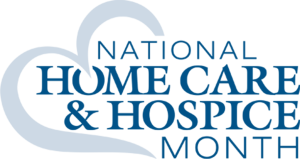National Home Care & Hospice Month: Resources and Action

Key Facts:
- Scope: More than 5 million Medicare beneficiaries receive home health services each year, and 1.7 million elect hospice care (CMS, 2023).
- Outcomes: Home health visits reduce 30-day readmissions by up to 25% for common medical conditions (Journal of Post-Acute & Long-Term Care Medicine, 2022).
- Workforce: The home-care sector employs 2.2 million caregivers; demand is projected to grow 21% from 2022–2032 (U.S. Bureau of Labor Statistics).
- Equity: Hospital-at-home models show comparable clinical outcomes with higher patient satisfaction, especially among rural and mobility-limited populations (NEJM, 2023).
Editor's Note
This article is part of the BHM Healthcare Awareness Series, designed to provide quick, ready-to-use content and links to official resources for internal staff communications, patient education, and social media.
Feel free to copy, adapt, and share.
Observation Date
November
History & Impact
First proclaimed by the National Association for Home Care & Hospice (NAHC) in 1982, National Home Care and Hospice Month recognizes the millions of nurses, aides, therapists, social workers, and volunteers who deliver compassionate, cost-effective care where patients feel most comfortable: at home. Observed each November, the campaign spotlights quality improvement, workforce recognition, and community education through nationwide proclamations, social media events, and local outreach led by agencies, health systems, and professional societies.
Why it Matters
C-suite leaders face escalating demand for post-acute and end-of-life services as value-based payment models pivot care to lower-cost settings. Operational teams need turnkey materials to celebrate staff, educate families, and strengthen referral pipelines; all while meeting CMS quality and equity benchmarks.
Quick Actions for Your Organization
For Leadership
Integrate home-based services into population-health strategy to curb readmissions and total cost of care.
Establish joint ventures with reputable agencies to expand hospice and palliative programs.
Allocate recognition funds and public-relations support for field staff during November.
For Implementation Teams
Launch an employee-appreciation campaign: share daily spotlight stories, badges, and thank-you videos.
Distribute NAHC social-media graphics and printable posters across intranet, lobbies, and partner clinics.
Host a virtual “Care at Home 101” for referring physicians and discharge planners; provide referral checklists.
Resources
Ready-to-Use Assets
The following links provide resources & information for creating internal or external campaigns to support or promote this healthcare observance. Please vet these resources for alignment with your organization.
- National Association for Home Care & Hospice — Home Care & Hospice Month Toolkit
- Centers for Medicare & Medicaid Services — Home Health Compare & Hospice Quality Reporting tools
- National Coalition For Hospice and Palliative Care — Inclusion and Access Toolkit
Talking Points
Copy & Paste Friendly
“November is National Home Care & Hospice Month—join us in honoring the clinicians who bring healing and comfort to patients at home.”
“Home-based care lowers readmissions and costs while boosting satisfaction. Let’s celebrate the teams making it happen!”
“Explore free NAHC toolkits to recognize caregivers and share the value of hospice and home health with your community.”
Disclaimer: Please verify all information, usage rights, and related guidelines with the official observance organizers and your organization’s policies to ensure proper alignment.
Frequently Asked Questions (FAQ)
Q1. What is the best way to measure ROI on a National Home Care & Hospice Month campaign?
Compare pre- and post-campaign data for referral volume, 30-day readmission rates, Hospice CAHPS scores, and employee-engagement surveys to show financial savings and quality gains.
Q2: Which home care and hospice performance metrics matter most to executives?
C-suite leaders track 30-day readmission reduction, average length of stay, net promoter score from referral sources, and overall cost of care to gauge value-based ROI.
Q3: How can multi-site health systems boost staff participation during Home Care & Hospice Month?
Provide a branded toolkit with posters, email banners, social templates, and run a branch-level recognition contest using a shared hashtag (e.g., #HomeCareMonth) to drive friendly competition and engagement.
Partner with BHM Healthcare Solutions
With over 20 years in the industry, BHM Healthcare Solutions is committed to providing consulting and review services that help streamline clinical, financial, and operational processes to improve care delivery and organizational performance.
We bring the expertise, strategy, and capacity that healthcare organizations need to navigate today’s challenges – so they can focus on helping others.
Are you ready to make the shift to a more effective process?

